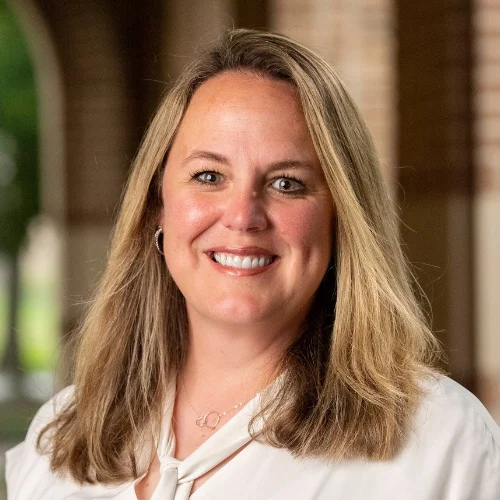
Katrina Spencer, Chief Financial Officer and Treasurer, brings nearly two decades of experience in higher education across both public and private institutions. Her career is marked by a commitment to improving financial processes and controls and fostering a collaborative culture. We had the privilege of speaking with Katrina to learn about her strategic initiatives, her vision for the future of Rice, and the cornerstones of her leadership style.
Can you share a little about your background and the pivotal experiences shaping your leadership style?
I have been in higher education for nearly 20 years, working at five different institutions. My diverse experiences across both public and private institutions have given me a broad perspective on what works well, what doesn’t, and what needs to change to improve our systems and processes.
One of the key lessons I’ve learned, which has significantly shaped my leadership style, is the importance of keeping the university’s mission at our core and ensuring that the people know the mission can’t happen without their contributions. I believe in providing support, resources, and clear goals while allowing my team the space to take ownership of their work, ensuring they feel empowered, valued, and motivated to achieve our collective objectives.
In your current role, what are your primary responsibilities, and what does a typical day look like for you?
No two days are alike, as I deal with issues within capital finance, treasury, risk management, budgeting, Procurement & Strategic Sourcing and the Controller’s office, including research cost accounting. The interconnectedness of my work means I spend a large portion of each day in meetings, discussing and strategizing with department heads, employees, and subject matter experts to address a myriad of financial questions. These meetings keep me connected to the university’s leaders and ensure that my team and I better internalize the implications to individual schools and departments the decisions that we make centrally. As such, each day brings new challenges and opportunities.
What are you working on now that you’re excited about?
A major focus of mine is building a better culture within budget and finance. We’re striving to create a collaborative environment that balances professional growth with responsibility and accountability. I’m really excited about the progress we’re making on this, particularly on the budget side with the Budget Transformation Initiative, improvements within the research administration side and the with the launch of two new training programs.
During our evaluation of our research administration structure, including the roles and FTEs, we discovered a substantial lack of training in research administration, as it’s not a field people typically study in college. To address this, we created the STARS Program, a 10-course training program developed in collaboration with various campus departments, including the vice president of research and Provost. We ran a pilot last fall and three sessions in the spring, training about 120 people. This highlighted the overall lack of training, leading us to launch a second program this year called Dollars Making Sense, which focuses on finance training for new employees. We’re currently piloting this program, refining it based on feedback, and plan to run it regularly for new hires.
Can you share your vision for the future? What does that look like for your team and Rice?
Right now, we’re in the process of developing our Budget and Finance strategic plan. Our goal is to align with the university’s strategic plan under the umbrella of the OF&S plan, while creating a clear roadmap for our initiatives. A significant part of this plan involves enhancing training for our staff within Budget and Finance, as well as for finance and research administration professionals across the board. We’re also focused on improving our systems, including the transition to iO, which is stabilized, but still has significant room for more effectiveness and efficiency. Additionally, we aim to foster cross-collaboration across the institution to ensure that our decisions positively impact all stakeholders. Ultimately, our vision is to support the university’s strategic initiatives effectively while maintaining fiscal responsibility and clarity.
Reflecting on your career, what have been some of your toughest challenges, and what accomplishments are you most proud of?
Some of the toughest challenges have also been my most rewarding accomplishments. One of the biggest challenges have been leading budget transformations, which involve many stakeholders and have a significant impact. Rice is the third institution where I’ve undertaken such a transformation, and it’s a tremendous amount of work. The key challenge is helping people understand the importance of these changes and ensuring they are fully implemented and operationalized within the organization. This process doesn’t end with the initial implementation; it requires ongoing effort to ensure the changes are effective and sustainable. Despite the challenges, successfully navigating these transformations and seeing the positive impact on the institution is something I’m very proud of.
I also want to share that this is my favorite job that I’ve ever had. Rice has a unique culture that balances preserving what’s good and true to its identity while being open to change and continuous improvement. Unlike other places where you hit a wall when trying to implement changes, at Rice, people are genuinely willing to adapt and solve problems. This balance and the collaborative spirit make it a phenomenal place to work. I love working with Kelly, my team, and my colleagues, and I’m happier now than I’ve been in any other position.
How do you recharge your battery and have fun?
To recharge and have fun, I do a lot of cycling and play pickleball. I started cycling more seriously about four years ago when Covid hit and have since completed my first century ride, which is 100 miles. Spending time with friends and family is another way I recharge, as it allows me to relax and enjoy meaningful activities with loved ones.

